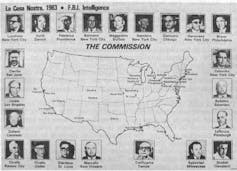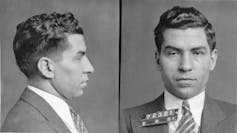When it comes to education, you may not think of a mobster or gang member as top of the class, but it turns out that even criminals benefit from more time spent at school.
Our 2017 study, which used a unique sample from the Italian American mafia, shows that mobsters who began their working lives in the 1930s made significant financial gains from extra years of schooling. We found that a mobster who completed just one extra year of education could increase earnings by around 8% on average.
Of course, mobsters by their very definition are high level, well connected members of complex criminal organisations – that mimic the structure of a large corporation. And in the 1940s, the Italian American mafia were involved in a large number of criminal activities in the US and overseas.
This included running gambling enterprises, large scale drug distribution and selling and loan sharking. To excel at such activities, meant the top personnel needed to be able to evaluate probabilities and risks, as well as have an understanding of logistics – both in terms of national and international boundaries. So maybe then it’s not so surprising that even the mafia can benefit from more time in school.
The business of crime
As part of our research, we searched the 1940 US population census manuscripts for the 723 mobsters who were listed in the 1960 records of the Federal Bureau of Narcotics (FBN). This was a bureau within the United States Department of Justice, which laid the groundwork for the modern Drug Enforcement Administration.
The US population census records revealed educational attainment, occupation, wages, employment status, addresses and housing values or rent for 414 of the mobsters in 1940. Using the FBN records, we were able to cross reference these details to find out the extent of each individual’s mob involvement and criminal career – which had been collected for investigative purposes.

Initially, we found the mobsters in our research spent about eight years of their lives in education. This is about one year less than the average for men at the time who were of similar age and race. And this appears to be consistent with the idea that criminals face lower economic benefits from spending extra years in school and so invest less time in it.
But our research also revealed that for every additional year a mobster spent in education, the average increase in income was in fact quite high. So although most mafia members did not attend school for very long, they saw a large economic benefit from any extra time spent there.
The right type of crime
As part of our research, we split our sample mobsters into two groups, “business criminals” and “non-business criminals”. The business criminals’ crimes included embezzlement, forgery, fraud, counterfeiting, gambling, liquor offences, prostitution, tax evasion, and bookmaking. The non-business criminals, on the other hand, tended to commit more violent crimes.
Using our data, we found that the income gains from an extra year of education for the business criminals were shown to be around 13-18%. Whereas for the non-business crinimals, the returns were a lot lower – at around 4-6%.
But of course, as criminal incomes may well have been under-reported at the time, we also used housing values in our research to check if this relationship between income and years spent in education still existed. But even with this comparison, the picture didn’t change. Mobsters who spent more time in the classroom were shown to live in, or rent houses of higher value than those with less education.

To put these estimates into context, we used the 1940 US Census to look at a sample of the mobster’s neighbours. This allowed us to compare the mobsters with their neighbours on educational attainment and income. We found that male neighbours of similar age to the mobsters got the same “income bonus” from additional years spent in education in their legal jobs as the mobsters did in their illegal activities. And in this way, crime appears to have been a rational route to economic success for Italian immigrants in the US.
Crime as a step up
Louis Ferrante, a former member of the notorious New York Gambino crime family, once claimed that “accomplished mobsters are just like top business leaders” and our research supports this claim.
Our research also demonstrates how participation in the Italian American mafia allowed first and second generation immigrants of Italian origin to achieve fairly large economic benefits from education. But this was only true for those involved in “white collar” crimes – where cognitive abilities were likely to be more valuable.
Clearly then even for a criminal organisation, a level of intelligence is certainly important – especially for those mob members found at the top of these complex criminal networks.
And who knows, given the link between education levels and criminal earnings, maybe similar patterns can be seen in other organised crime groups – like the Russian mafia or Mexican drug cartels.

